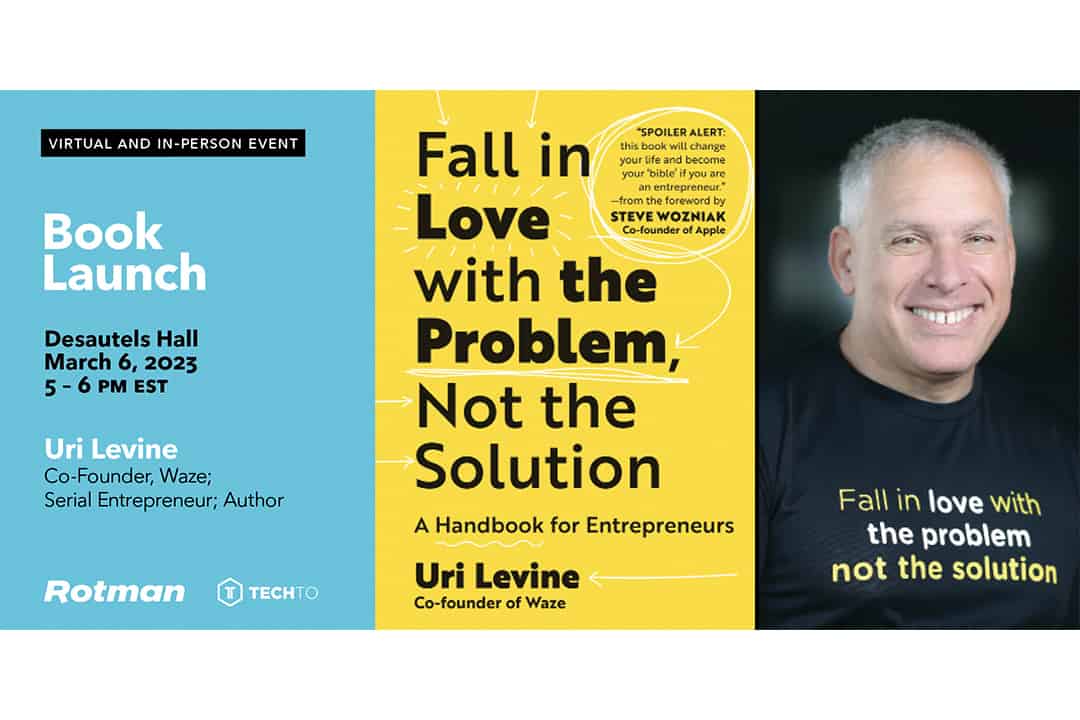From March 6–9, U of T Entrepreneurship hosted its seventh annual Entrepreneurship Week. There were several events and speeches to celebrate U of T’s entrepreneurial spirit and to connect budding student entrepreneurs with business leaders.
I had the opportunity to attend a talk given by Uri Levine – the co-founder of Waze and the first board member of Moovit. Waze is a subsidiary company of Google that helps drivers navigate roads and Moovit is a service provider and journey planner application.
Following the launch of his new book, Fall in Love With the Problem, Not the Solution: A Handbook for Entrepreneurs, Levine shared the insight and expertise he gained after founding Waze. Levine published this book to share his philosophy on entrepreneurship, failure, and success; he hopes to teach others how to solve problems and create value.
The Waze journey
Levine is a successful technology entrepreneur who has founded more than ten startups. So far, he has created more than $2 billion in enterprise value, but this figure is growing by the year. He is most known for Waze, which Google acquired in 2013 for $1.2 billion USD. His other startups, such as Refundit or Engie, are still small and may even fail, but they are all centered around one idea — solving problems.
Funding was the first challenge Levine and his co-founder Ehud Shabtai faced as it was extremely difficult to come by for a company that was considered rather ambitious for its time; in 2006, when Waze first launched, smartphones did not exist. Instead, Waze was running on personal device assistants, which significantly depressed interest from potential investors. However, since Levine focused on the problem of traffic jams, he was able to get a few investors on board and expand the project.
Waze is entirely crowd sourced, so the only reason it succeeded is that the team was able to convince people that using the app would benefit them in the end. The initial users of Waze were driving on blank white maps, which filled in as they drove. Since Waze was solving a real problem, they managed to convince people to use it anyway. Eventually, it expanded worldwide, and today it is a major navigation application.
Don’t be afraid to fail
“If you’re afraid to fail, you already failed,” said Levine in his speech.
While people today are told not to fail, Levine thinks that failing is an important part of the process. In fact, to all the parents out there, he says to teach your kids to fail. Levine believes that people need to fail fast, as this gives more time to try something else and eventually succeed.
According to Levine, you never know when you will fail or need to pivot, but you must always be ready. Throughout the journey of building Waze, his team would succeed, then fail, then succeed, and then fail again. However, they never lost sight of the “North Star” and remained focused on solving the problem of bad traffic.
Focusing on the problem, not the solution
Focusing on the problem did more than provide Levine with guidance; it was also part of the startup’s marketing and brand. When people asked him what Waze did, Levine told them that he was solving the problem of getting rid of traffic jams.
By focusing on the problem, people can actually relate to and understand the solution; if Levine was to focus on the solution, Waze would make less sense. The solution is a crowd-sourced, artificial intelligence-based, navigation app, and in 2009, when ChatGPT and Tesla Autopilot did not exist, this was not easy for people to understand.
Levine focuses on the problem because that is what people care about. In fact, he says that if you are solving a real problem, you are almost guaranteed to add value to society.
Today, Levine sees himself as a teacher — someone who can share lessons and make the world a more entrepreneurial place. Although he could only discuss part of the book, it contains the lessons he learned every step of the way, from ideation to scaling his company.
His insight will help budding entrepreneurs with funding, hiring and firing, customer feedback, and more aspects of the entrepreneurial journey. The book is primarily designed for entrepreneurs, but there were several other business executives at the book talk ready to gain inspiration, as innovation is a critical part of most corporations.
If you are interested in learning about entrepreneurship or innovation, Falling in Love With The Problem, Not The Solution might be good for you.


